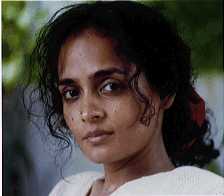| the-south-asian.com SEPTEMBER 2001 | ||
| about us contact us data bank past issues the craft shop the print gallery | ||
|
SEPTEMBER 2001 Contents Interview Heritage Cultural Heritage of south Asia People Communities Lifestyle Films Editor's Note
Books
|
Page 2 of 6 Arundhati Roy interviewed by David Barsamian (continued)
"I didn't have a caste, and I didn't have a class, and I had no religion, no traditional blinkers, no traditional lenses on my spectacles, which are very hard to shrug off. I sometimes think I was perhaps the only girl in India whose mother said, "Whatever you do, don't get married" On a cold, mid-February afternoon, Roy gave the annual Eqbal Ahmad lecture at Hampshire College in Amherst, Massachusetts, before a huge crowd. It was a powerful, political talk, and afterward she was besieged by a long line of mostly young South Asian women, many of whom are studying at one of the five colleges in the Amherst area. She donated her lecture fee to earthquake relief in Gujarat.The next morning, I interviewed her in the back seat of a car taking her from Amherst to Logan Airport in Boston. The two-hour drive went by in a flash.Q: You grew up in Kerala. What's the status of women there? Arundhati Roy: Women from Kerala work throughout India and the world earning money to send back home. And yet they'll pay a dowry to get married, and they'll have the most bizarrely subservient relationships with their husbands. I grew up in a little village in Kerala. It was a nightmare for me. All I wanted to do was to escape, to get out, to never have to marry somebody there. Of course, they were not dying to marry me [laughs]. I was the worst thing a girl could be: thin, black, and clever.Q: Your mother was an unconventional woman. Roy: She married a Bengali Hindu and, what's worse, then divorced him, which meant that everyone was confirmed in their opinion that it was such a terrible thing to do in the first place. In Kerala, everyone has what is called a tharawaad [lineage]. If you don't have a father, you don't have a tharawaad. You're a person without an address. That's what they call you. I grew up in Ayemenem, the village in which The God of Small Things is set. Given the way things have turned out, it's easy for me to say that I thank God that I had none of the conditioning that a normal, middle class Indian girl would have. I had no father, no presence of this man telling us that he would look after us and beat us occasionally in exchange. I didn't have a caste, and I didn't have a class, and I had no religion, no traditional blinkers, no traditional lenses on my spectacles, which are very hard to shrug off. I sometimes think I was perhaps the only girl in India whose mother said, "Whatever you do, don't get married" [laughs]. For me, when I see a bride, it gives me a rash. I find them ghoulish, almost. I find it so frightening to see this totally decorated, bejeweled creature who, as I wrote in The God of Small Things, is "polishing firewood."Q: Tell me a little more about your mother. Roy: She is like someone who strayed off the set of a Fellini film. She's completely nuts. But to have seen a woman who never needed a man, it's such a wonderful thing, to know that that's a possibility, not to suffer. We used to get all this hate mail. Though my mother runs a school and it's phenomenally successful--people book their children in it before they are born--they don't know what to do with her, or with me. The problem is that we are both women who are unconventional in their terms. The least we could have done was to be unhappy. But we aren't, and that's what bothers people. By the way, my mother is very well known in Kerala because in 1986 she won a public interest litigation case challenging the Syrian Christian inheritance law that said a woman can inherit one-fourth of her father's property or 5,000 rupees, whichever is less. The Supreme Court actually handed down a verdict that gave women equal inheritance retroactive to 1956. But few women take advantage of this right. And the churches have gone so far as to teach fathers to write wills that disinherit their daughters. It's a very strange kind of oppression that happens there.
Copyright © 2000 - 2001 [the-south-asian.com]. Intellectual Property. All rights reserved. |
|
